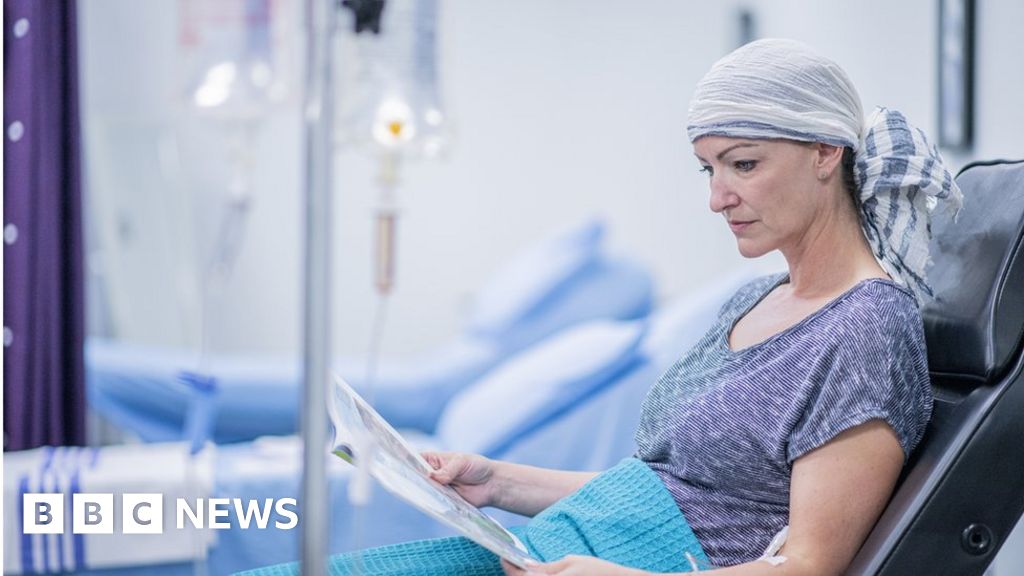- By Marie-Louise Connolly
- BBC News NI health correspondent
Image source, Getty Images
The research looked at early-onset cancers, which means cancers diagnosed in adults under the age of 50
Cancers diagnosed in people aged between 18 and 49 in Northern Ireland have risen by 20% in the past 25 years, according to new research,
Queen’s University Belfast and the NI Cancer Registry compared 2019 statistics with 1993 figures, when registry records began.
Figures show that, by 2019, 1,076 people aged 18-49 were diagnosed with some form of cancer.
Prof Helen Coleman, who was involved in the research, said it was worrying.
“What’s also worrying is that the types of cancers are changing,” she told BBC News NI.
“Traditionally among men it would have been testicular cancer and brain tumours. This research shows a rise in colorectal cancer instead.”
The research looked at early onset cancers, which means cancers diagnosed in adults under the age of 50.
It found that cancers commonly seen in older people – such a bowel, breast, stomach and pancreatic cancers – are now being diagnosed in younger adults.
Changes in environment and lifestyle?
Prof Coleman said researchers need to better understand what is causing cancers in young adults.
“The rise has also been seen in other western countries such as across the UK, America and Australia, which suggests it is something to do with changes in our environment and lifestyle.”
She said there are various theories associated with the increase, including people eating more processed foods and taking antibiotics from an earlier age, but nothing definitive.
Image source, Getty/choja
Cancers commonly seen in older people, such as breast, bowel, stomach and pancreatic cancers, are now being diagnosed in younger adults
Risk factors such as smoking, alcohol and obesity should not be ignored.
“We would appeal to men and women in the age group to be aware of any changes in their body that are unusual for them and to contact their GP if they have concerns,” she said.
Don’t ignore symptoms
Prof Coleman stressed that the message needs to get out there that younger people can get cancer too.
“Don’t just wait because you consider yourself to be too young to get cancer. Don’t ignore any symptoms which are unusual to you. Early diagnosis is key.”
The research highlights that within the 18-49 age group there was a higher incidence of diagnosis among women – largely driven by breast cancer cases.
Image source, Queen’s University Belfast
Prof Helen Coleman said prevention and early detection are key to improving outcomes
From 1993-2019 there was a 27% increase in the incidence rate of cancers in women compared to a 9% increase in men.
The most common cancers in men aged between 40 to 49 were colorectal, melanoma, lung and head cancers.
In women aged 40 to 49 the most common malignancies were breast, melanoma, and colorectal cancers.
According to Prof Coleman, patients with early onset cancers face “unique” challenges across the entire cancer process from investigation and diagnosis through treatment to survivorship or end-of-life care.
‘Rebellious hope’
Northern Ireland’s cancer strategy has yet to be fully implemented.
Prof Coleman said all those who took part in the review believes it highlights relevant areas for discussion about early onset cancers, including lowering the age of screening.
“Prevention and early detection are key to reducing disease burden and improving cancer outcomes,” she added.
“As healthcare professionals and scientific researchers, we should be aiming to create treatment pathways for early onset cancers where at each stage patients and their families are given autonomy and support relevant to their individual circumstances, where their concerns are addressed, and treatment is evidence-based and innovative.”
Ending their research on a positive note, those involved said no one should underestimate the power of hope – indeed “rebellious hope”, in the words of the late Dame Deborah James who died from bowel cancer.
It added there must be hope for young cancer patients and their families, stating: “We have the opportunity at each stage of the patient journey to contribute to more effective treatments, a better quality of life, living beyond cancer or meaningful palliative care.”

Sarah Carter is a health and wellness expert residing in the UK. With a background in healthcare, she offers evidence-based advice on fitness, nutrition, and mental well-being, promoting healthier living for readers.








